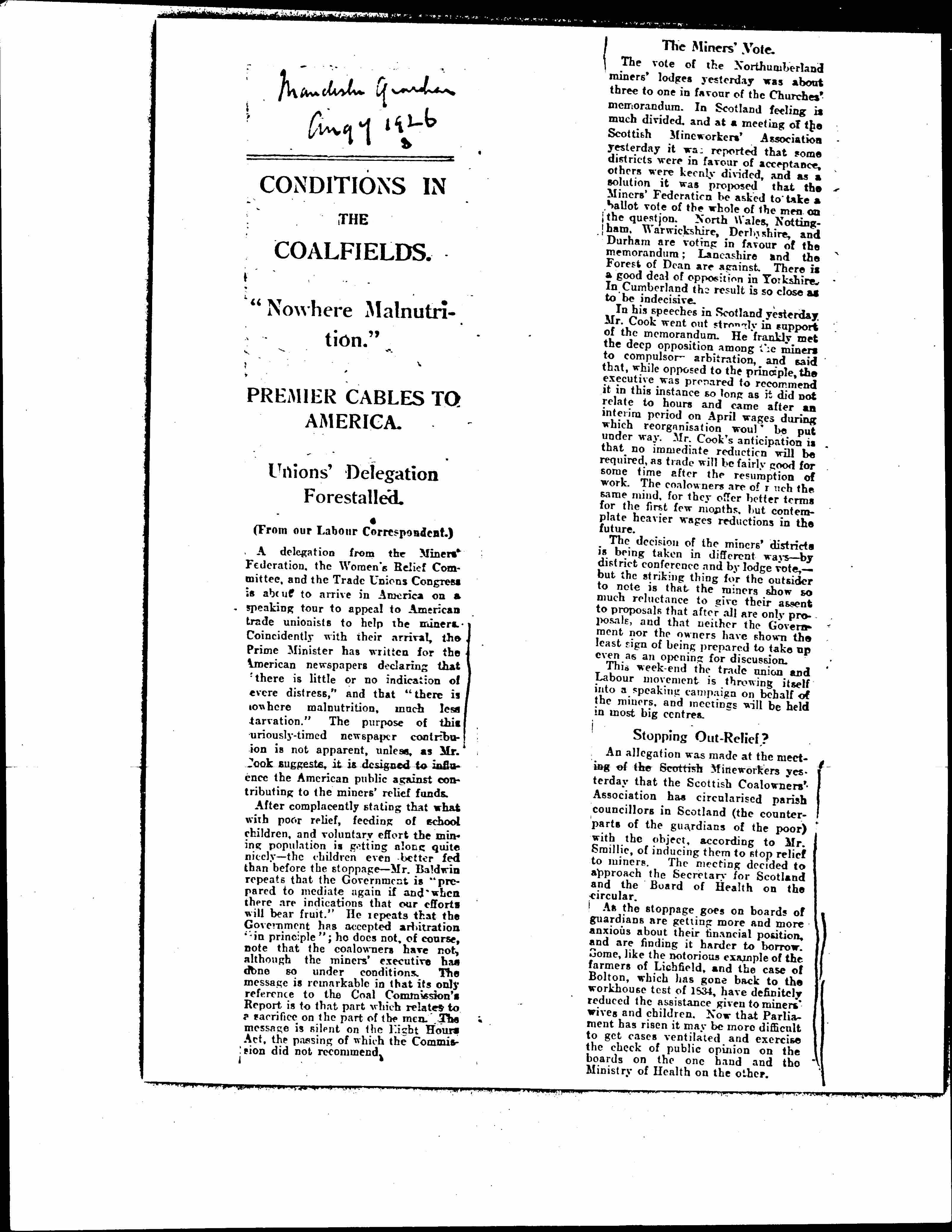A delegation from the Miners' Federation, the Women’s Relief Committee, and the Trade Unions Congress is about to arrive in America on a speaking tour to appeal to American trade unionists to help the miners. [Coincidentally] with their arrival, the Prime Minister has written for the American newspapers declaring that “there is little or no indication of severe distress,” and that "there is nowhere malnutrition, much less starvation.” The purpose of this curiously-timed newspaper contributions is not apparent, unless, as Mr. Cook suggests, it is designed to influence the American public against contributing to the miners' relief funds.
After complacently stating that what with poor relief, feeding of school children, and voluntary effort the mining population is getting along quite nicely -- the children even better fed than before the stoppage -- Mr. Baldwin repeats that the Government is “prepared to mediate again if and when there are indications that our efforts will bear fruit.” He repeats that the Government has accepted arbitration “in principle;” he does not, of course, note that the [coal owners] have not, although the miners' executive has done so under conditions. The message is remarkable in that its only reference to the Coal Commission's Report is to that part which relates to a sacrifice on the part of the men. The message is silent on the Eight Hours Act, the passing of which the Commission did not recommend.
The vote of the Northumberland miners’ lodges yesterday was about three to one in [favor] of the Churches' memorandum. In Scotland feeling is much divided, and at a meeting of the Scottish Mineworkers’ Association yesterday it was reported that some districts were in [favor] of acceptance, others were keenly divided, and as a solution it was proposed that the Miners' Federation be asked to take a ballot vote of the whole of the men on the question. North Wales, Nottingham, Warwickshire, Derbyshire, and Durham are voting in favor of the memorandum; Lancashire and the Forest of Dean are against. There is a good deal of opposition in Yorkshire. In Cumberland the result is so close as to be indecisive.
In his speeches in Scotland yesterday Mr. Cook went out strongly in support of the memorandum. He frankly met the deep opposition among the miners to compulsory arbitration, and said that, while opposed to the principle, the executive was prepared to recommend it in this instance so long as it did not relate to hours and came after an interim period on April wages during which [reorganization] would be put under way. Mr. Cook's anticipation is that no immediate reduction will be required, as trade will be fairly good for some time after the resumption of work. The [coal owners] are of much the same mind, for they offer better terms for the first few months, but contemplate heavier wage reductions in the future.
The decision of the miners' districts is being taken in different ways -- by district conference and by lodge vote, -- but the striking thing for the outsider to note is that the miners show so much reluctance to give their assent to the proposals that after all are only proposals, and that neither the Government nor the owners have shown the least sign of being prepared to take up even as an opening for discussion.
This [weekend] the trade union and Labour movement is throwing itself into a speaking campaign on behalf of the miners, and meetings will be held in most big [centers].
An allegation was made at the meeting of the Scottish Mineworkers yesterday that the Scottish [Coal Owners] Association has [circularized] parish [councilors] in Scotland (the counterparts of the guardians of the poor) with the object, according to Mr. Smillie, of inducing them to stop relief to miners. The meeting decided to approach the Secretary for Scotland and the Board of Health on the circular.
As the stoppage goes on boards of guardians are getting more and more anxious about their financial position, and are finding it harder to borrow. Some, like the notorious example of the farmers of Lichfield, and the case of Bolton, which has gone back to the workhouse test of 1834, have definitely reduced the assistance given to miners' wives and children. Now that Parliament has risen it may be more difficult to get cases ventilated and exercise the check of public opinion on the boards on the one hand and the Ministry of Health on the other.








Comments